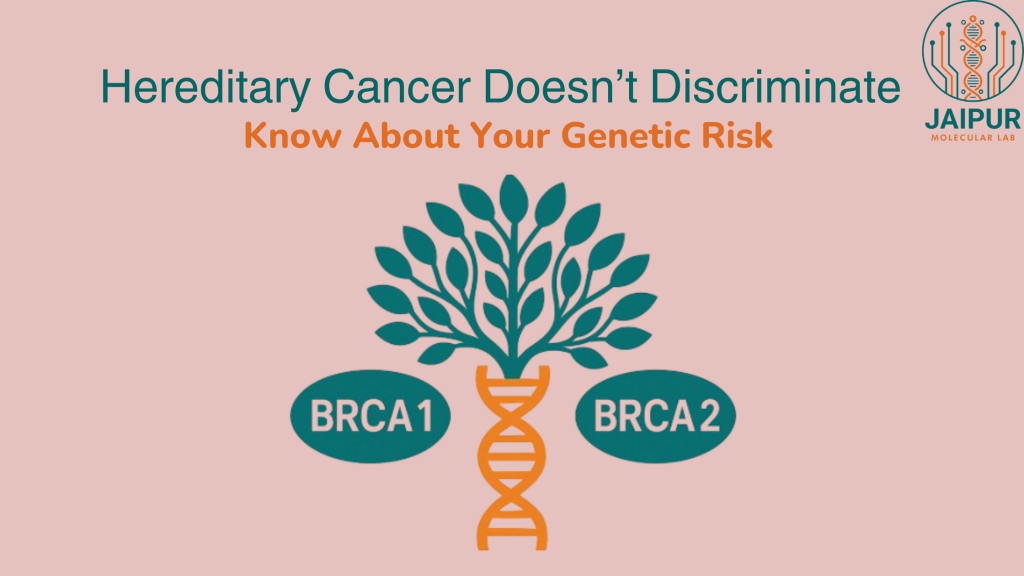
Introduction: Why Your Family History Matters
Every family carries a unique story—and sometimes, hidden within that story are silent threads of inherited cancer risk. You might have heard of BRCA1 or BRCA2, but they are just part of a broader landscape of genetic mutations that increase the risk of developing cancer. Whether you’re a woman or a man, young or old, understanding your genetic risk is one of the most powerful steps you can take toward early detection, prevention, and even life-saving intervention.
Today, up to 10% of all cancers are hereditary. Knowing whether you carry a mutation in genes like BRCA1, BRCA2, PALB2, or those linked to Lynch syndrome could dramatically alter your health trajectory. With the rising availability of genetic testing and biobanking, proactive health management has never been more accessible.
What Is Hereditary Cancer?
Hereditary cancer results from genetic mutations passed down from one generation to the next. If a parent carries a faulty gene, there’s a 50% chance they could pass it on to their child. These mutations significantly increase the risk of certain cancers, such as:
- Breast and Ovarian Cancer (linked to BRCA1/2, PALB2)
- Colorectal and Uterine Cancer (linked to Lynch syndrome)
- Prostate and Pancreatic Cancer
- Melanoma
Common Red Flags of Hereditary Cancer Risk
- Cancer diagnosed before age 50
- Multiple relatives with the same or related cancers
- Individuals with more than one primary cancer
- Male breast cancer
- Ashkenazi Jewish ancestry with a family history of cancer
If you or someone in your family fits any of these descriptions, it may be time to consider genetic testing.
Understanding the Most Impactful Cancer Genes
BRCA1 & BRCA2
Mutations in these genes are most famously associated with breast and ovarian cancers, but they also raise risks for prostate and pancreatic cancers. People with these mutations can have up to an 87% lifetime risk of developing breast cancer.
PALB2
PALB2 partners with BRCA2 to repair DNA. A mutation here significantly raises breast cancer risk in both women and men.
Lynch Syndrome (MLH1, MSH2, MSH6, PMS2, EPCAM)
This group of mutations is linked to colorectal, endometrial, ovarian, stomach, and urinary tract cancers. It’s one of the most common hereditary cancer syndromes.
TP53
Associated with Li-Fraumeni Syndrome, TP53 increases the risk of multiple cancer types at young ages—including sarcomas, brain tumors, and leukemia.
How to Know If Cancer Runs in Your Family
You don’t need to be a geneticist to begin the process. Start by gathering your family’s cancer history:
- Who in your family had cancer?
- What type of cancer?
- At what age were they diagnosed?
Bring this information to your healthcare provider or genetic counselor. They’ll assess whether genetic testing is right for you and recommend a multigene panel if needed.
What Is Genetic Testing and How Does It Work?
Genetic testing involves analyzing a blood or saliva sample to detect mutations in specific cancer-related genes. At Jaipur Molecular Lab (JML), for example, BRCA1/2 germline testing and complete breast cancer profiling are conducted in-house, meaning faster, more accurate results.
Best Genetic Tests for Hereditary Cancer Risk
- Single Gene Testing (for known mutations)
- Panel Testing (e.g., BRCA1/2, PALB2, TP53, Lynch syndrome genes)
- Tumor Profiling (identifies somatic mutations specific to the cancer)
These tests help shape personalized screening plans, lifestyle adjustments, and even decisions like prophylactic mastectomy or oophorectomy.
Lifestyle Changes to Reduce Hereditary Cancer Risk
Carrying a genetic mutation does not mean you’ll definitely get cancer. Lifestyle plays a major role in mitigating risk:
- Maintain a healthy weight
- Exercise regularly
- Avoid smoking and limit alcohol
- Eat a nutrient-rich diet (high in fiber, antioxidants, healthy fats)
- Stay up to date on screenings (mammograms, colonoscopies, transvaginal ultrasounds)
In some cases, risk-reducing medications or surgeries may be recommended.
Screening & Surveillance for High-Risk Individuals
How often should women or men with a family history of cancer get screened? It depends on the gene and family history:
- Annual mammograms and MRIs (starting as early as 25 for BRCA mutation carriers)
- Colonoscopy every 1–2 years (for Lynch syndrome)
- Transvaginal ultrasound and CA-125 blood test (for ovarian cancer surveillance)
Consult your doctor or genetic counselor for a tailored plan.
Emotional Wellbeing & Support Resources
Knowing you carry a mutation can be emotionally overwhelming. But support is available:
- Genetic counseling (before and after testing)
- Support groups (e.g., for BRCA mutation carriers)
- Therapy or psycho-oncology services
Coping Tips:
- Focus on what you can control: lifestyle, screenings, knowledge.
- Share results with close relatives—they may benefit too.
- Take your time processing the information and making decisions.
Talking to Your Family About Hereditary Cancer
It’s not easy, but it’s essential. Your test results may be relevant to your siblings, children, and extended family. Here’s how to approach the conversation:
- Be honest and use simple language
- Share your test report if they’re open to it
- Encourage them to talk to a doctor
This isn’t just about you—it’s about the generations ahead.
Where to Get Tested in Rajasthan
Jaipur Molecular Lab is proud to be Rajasthan’s first lab offering complete in-house BRCA1/2 testing, breast cancer profiling, and NIPT. With expert oncopathologists, genetic counselors, and the fastest turnaround time in the state, your care is timely, trustworthy, and guided by global standards.
Conclusion: Knowledge Is Power, Action Is Lifesaving
Hereditary cancer doesn’t discriminate—it affects women, men, and entire families. But with knowledge, testing, and support, we can stay one step ahead.
Whether you’re just starting to learn about your risk or considering genetic testing, take the next step. Talk to your doctor. Look into biobanking. And remember: your DNA is not your destiny—it’s your map.